

California to Give Web Courses a Big Trial. Online courses need human element to educate. Online courses are proliferating, says Douglas Rushkoff, but will really succeed when they bring humanity to learning process Douglas Rushkoff: Education is under threat, but online computer courses are not to blameHe says education's value hard to measure; is it for making money or being engaged?
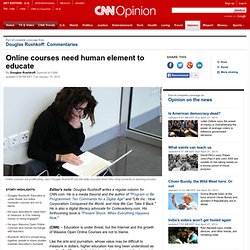
He says Massive Open Online Courses lack human exchange with teachersRushkoff: MOOCs should bring together people to share studies, maintain education's humanity Editor's note: Douglas Rushkoff writes a regular column for CNN.com. He is a media theorist and the author of "Program or Be Programmed: Ten Commands for a Digital Age" and "Life Inc.: How Corporatism Conquered the World, and How We Can Take It Back. " He is also a digital literacy advocate for Codecademy.com. (CNN) -- Education is under threat, but the Internet and the growth of Massive Open Online Courses are not to blame. What is learning, really? Douglas Rushkoff Education is about more than acquiring skills. Keeping College Costs Down. » Napster, Udacity, and the Academy Clay Shirky.
Fifteen years ago, a research group called The Fraunhofer Institute announced a new digital format for compressing movie files.
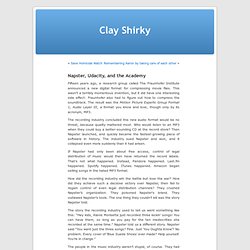
This wasn’t a terribly momentous invention, but it did have one interesting side effect: Fraunhofer also had to figure out how to compress the soundtrack. The result was the Motion Picture Experts Group Format 1, Audio Layer III, a format you know and love, though only by its acronym, MP3. The recording industry concluded this new audio format would be no threat, because quality mattered most.
Who would listen to an MP3 when they could buy a better-sounding CD at the record store? Then Napster launched, and quickly became the fastest-growing piece of software in history. If Napster had only been about free access, control of legal distribution of music would then have returned the record labels. How did the recording industry win the battle but lose the war?
The people in the music industry weren’t stupid, of course. But who faces that choice? Essay critiques the ideas of Clay Shirky and others advocating higher ed disruption. Clay Shirky is a big thinker, and I read him because he’s consistently worth reading.
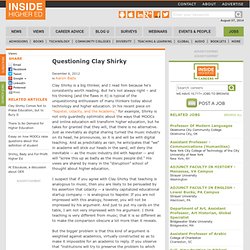
But he’s not always right – and his thinking (and the flaws in it) is typical of the unquestioning enthusiasm of many thinkers today about technology and higher education. In his recent piece on "Napster, Udacity, and the Academy," for example, Shirky is not only guardedly optimistic about the ways that MOOCs and online education will transform higher education, but he takes for granted that they will, that there is no alternative. Just as inevitably as digital sharing turned the music industry on its head, he pronounces, so it is and will be with digital teaching.
Open online courses – an avalanche that might just get stopped. These days there are plenty of prophets preaching hi-tech and digital solutions to the problems of expanding access to knowledge and higher education.
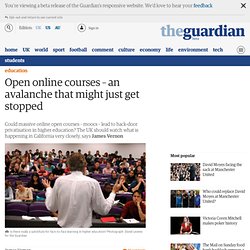
Barely a week goes by without some new hymn to education technology, open-source software or open-access publishing. In the US, the growing chorus for online education through massive open online courses, or moocs, has been deafening. But in Britain, it has barely registered. Last December, the commercial launch of the Open University's mooc platform, FutureLearn, attracted the participation of a dozen universities and the support of David Willetts, but little response from Britain's beleaguered academics. No wonder that last month Sir Michael Barber, the chief education adviser of Pearson, the world's largest profit-making education provider, proclaimed that universities were powerless to stop the online avalanche. Historically, the University of California has often proved a weathervane for global trends in higher education. Quelles sont les différents types de plates-formes de MOOC et comment choisir celle qui nous convient ? Le développement des MOOC, initié par les différents facteurs évoqués lors de notre précédent article, est à la fois soutenu et alimenté par les nombreuses possibilités techniques offertes à tous ceux qui souhaitent diffuser leur cours en ligne.
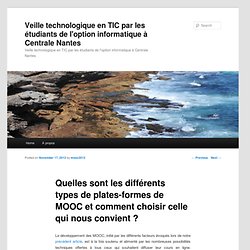
Effectivement, l’aspect communautaire lié au MOOC a poussé au lancement de nombreux outils de création, de mise en ligne et de gestion des MOOC, tous plus ou moins destinés à faciliter le partage des cours. Des outils simples et performants étant ce qu’il y a de plus efficace pour aider un enseignant à se lancer.
Il existe donc non seulement des plates-formes lancées développées par de grandes universités qui se chargent de les maintenir et de fournir le contenu, mais on peut également trouver des outils open source que l’on peut employer uniquement pour la publication sans forcément avoir l’âme d’un développeur. Il est impossible de réaliser une étude des MOOC sans aborder le point des plates-formes MOOC.